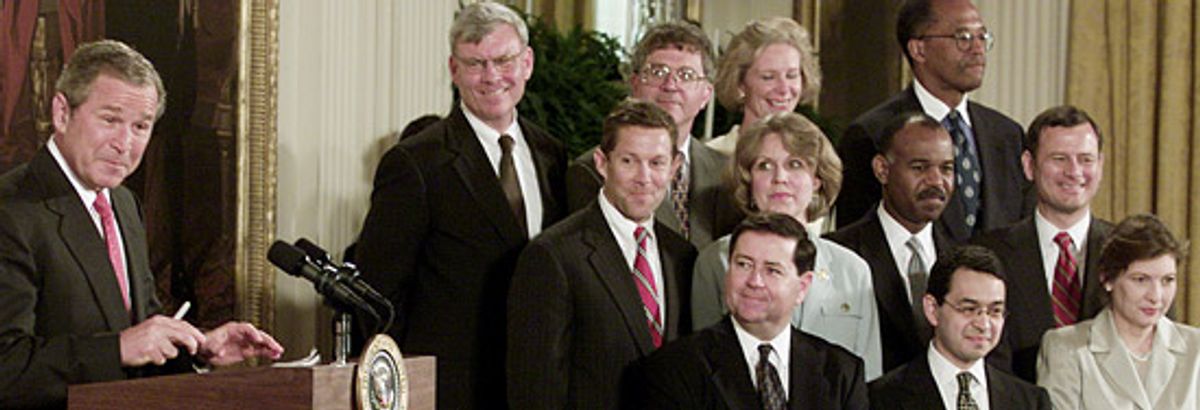One of President Bush's most controversial judicial nominees has admitted to presiding over several cases in which he held a financial interest, in violation of federal law. In his first public response to the ethical violations revealed by the Center for Investigative Reporting and Salon on May 1, Judge Terrence W. Boyle of North Carolina said the conflicts were inadvertent, minor mistakes. In a letter to Senate Majority Leader Bill Frist and Judiciary Committee chairman Arlen Specter, made public July 12, Boyle said that hearing charges of conflicts of interest "surprised and upset me." He nevertheless disputed several of the charges.
The Salon/CIR investigation showed that Boyle issued orders in at least nine cases involving corporations in which he reported stock holdings. "In approximately four cases, the screening system in place at the Clerk's Office and in my chambers missed the appearance of a potential conflict," Boyle wrote. "Accordingly, I unknowingly and unintentionally participated in these cases while I held a minimal number of shares in one of the parties." He added: "While my stock holdings were relatively insignificant, I regret that the oversight occurred. It certainly was not my intention to participate in a case where I held stock in one of the parties."
The conflicts of interest have thrown into doubt Boyle's confirmation to the 4th U.S. Circuit Court of Appeals -- second only in judicial authority to the U.S. Supreme Court. Frist indicated in April that he would push for a full Senate vote on Boyle, a favorite of conservatives, in May. After the report on his ethical violations, however, top Democrats called for Boyle's nomination to be withdrawn. On Wednesday, Vermont Sen. Patrick Leahy, the ranking Democrat on the Judiciary Committee, reaffirmed his opposition.
"These breaches and his avoiding full accountability compound the already compelling reasons why this nomination has become so controversial, including strong opposition from many law enforcement groups around the country," Leahy told Salon. "The White House should withdraw this nomination instead of pushing for this promotion to a lifetime seat on one of our highest courts."
Specter, who had labeled the conflicts potentially "disqualifying," had conducted his own investigation. He and Frist wrote to Boyle asking for a written explanation of the ethical conflicts. (Frist and Specter did not return Salon's calls for comment Wednesday.) In his letter, Boyle mounted a defense of his record that mirrors one made by North Carolina Sen. Elizabeth Dole, and one spelled out in a memo circulated by the judge's former clerks. As Salon reported on May 23, the defense contains inaccuracies and ignores the letter of federal ethics law.
Boyle wrote that the conflict involving Quintiles, a pharmaceutical-services company, is "categorically untrue." The case occurred in 2001, when Boyle denies owning any stock in Quintiles. However, Boyle's official financial disclosure report covering the year 2001 lists stock in Quintiles. His 2002 filing shows that he sold his Quintiles stock after the case was over. Boyle did not address this inconsistency in his letter.
Boyle also denied that he had any financial interest in three cases involving Midway Airlines. Boyle was a trustee of one of his children's trusts, which held Midway stock. The law on judicial conflicts of interest makes it clear that a judge who is a trustee does have a financial interest in the trust.
Although Boyle regretted his lack of oversight in four cases, he went on to write that "whatever minor financial interest I may have had in the case in no way affected my decision-making or the outcome of the case."
Nevertheless, federal statute since 1974 does not allow judges to sit on cases in which they have a financial interest, no matter how small, and no matter how the case may turn out. Leslie W. Abramson, a judicial ethics expert at the University of Louisville's law school, said, "Did he violate the statute? Yes." Professor Monroe Freedman of Hofstra University School of Law added that Boyle was "trying to fudge the language" by calling clear-cut violations "the appearance of a potential conflict."
In his letter, Boyle stated he always makes a "conscientious effort" to screen cases for possible conflicts, and informs his court clerk's office of his financial interests for additional screening. "This method was the best practice available over time, but it was not flawless," he wrote. "Some cases were missed by the screening process."
But Michael Brooks, the acting clerk of Boyle's court, told Salon in April that the clerk's office does not screen for financial conflicts, leaving that to the individual judge. Brooks said the court didn't use a computer system to catch conflicts because "you get some false positives that way, and we've been successful with the current situation." Boyle, however, apparently contradicted Brooks and wrote that the computerized system wasn't even available "until recent weeks."
Neither Brooks nor Boyle returned calls Wednesday seeking comment. Boyle has not responded to numerous calls and a detailed letter from Salon, asking for an explanation before the original report on his conflicts was published. He did state in his letter to Frist that he wrote a letter of explanation to the Chief Judge of the 4th Circuit and President Bush.



Shares